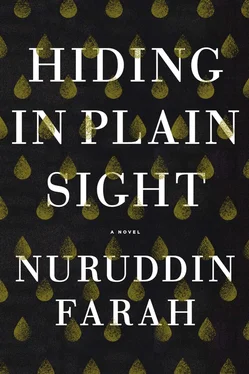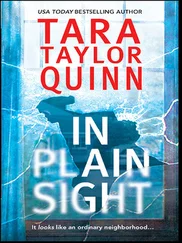“Would you like your breakfast, Salif?”
Salif’s expression darkens with unspoken outrage that Bella won’t engage with him in conflict. He has always hated it when adults change the topic of conversation to mundane matters, like food or sleep. When he was younger, he would create ugly scenes when that happened. He was notorious for his ill-timed tantrums, especially in public places — airports or the homes of his parents’ friends. He seemed, in fact, to take great delight in embarrassing his father in front of his friends. As a result, Bella knows, Aar seldom brought anyone home, and until Gunilla, he had never brought home his women friends for fear that his children might behave badly or speak spitefully in their presence. Bella wonders if Salif will one day revisit these ugly confrontations with self-loathing. Just now, he is biting hard on his thumb, as if to keep himself from speaking.
Bella says to Dahaba, “Do you cook?”
“I can make spaghetti and sauce.”
“And what can Salif make?”
“Nothing, not even his favorite bacon.”
“At nearly seventeen, he should be able to make something, surely,” says Bella, opening the fridge and bringing out the butter and then going to the cupboards to find a frying pan. She has difficulties turning on the gas, but Dahaba helps. Then Dahaba takes a seat, gazing at her auntie in delight, in contrast to Salif, who stands silently in the kitchen doorway, pretending still to be angry.
Bella says to Dahaba, “Do you eat bacon as well?”
“Yes, I do, Auntie.”
“And yet you claim to be a Muslim?”
Dahaba nods her head and says nothing.
“We do eat it and are proud of it,” Salif says defiantly.
Bella opens the packet of bacon and begins to separate the stringy rashers and lay them in the frying pan.
Salif adds, “Our father always insisted on us being Muslim, culturally speaking, even though he partook of the odd glass of wine at birthdays and other celebrations, and occasionally with his meals.”
“How are Qamar and Zubair?” Bella asks, changing the subject. Qamar and Zubair are Fatima and Mahdi’s daughter and son, who are close in age to Dahaba and Salif and not only go to the same school but also have similar interests. Zubair, like Salif, is into soccer to the point of obsession, and Qamar, like Dahaba, is a budding feminist.
“We haven’t seen them for a couple of days,” Salif says, this time not sulking at the change of topic.
“I spoke to Auntie Fatima and Uncle Mahdi,” Bella tells him.
“Can we arrange to meet them?” Salif asks.
“As soon as you like,” Bella says.
“Tomorrow?”
“I can’t see why not,” Bella says.
Bella knows that it is only because Mahdi was away in Somalia at the time of Aar’s death, and Fatima had a medical procedure scheduled, that the children went to stay with James and Catherine rather than with these dear family friends. She also knows that Qamar and Zubair do not eat bacon and that their parents do not touch liquor at all. But they are tolerant enough of their friends’ “un-Islamic” ways.
She also suspects that Valerie would go bonkers if she knew about her children’s closeness to the family, who no doubt encourage them to identify primarily as Somali and Muslim. Valerie harbors an ancient antipathy to Islam, springing from a story about her grandfather being sodomized when he fell into the hands of a local militia in North Africa.
Bella puts a plate before Salif. “Here, done. Come and eat.”
Salif drowns the bacon in huge spurts of ketchup, and despite the knife and fork she has set by his plate, he uses his fingers, mopping his plate with the last rasher.
Then he says to Bella, “About our father?”
“What about him?”
“In his will, did he ask to be cremated?”
“Not to my knowledge,” Bella says. “But I have not yet seen his final will. Why do you ask?”
“Mum talked about cremation yesterday.”
“She mentioned nothing of the sort to me,” Bella says, reminding herself to stay calm.
“Where was he buried?”
Bella takes care not to give any more information than necessary, as it will serve no one’s interest. So she does not disclose all that she has learned of the circumstances of Aar’s death but says only, “In Mogadiscio, soon after he died.”
Dahaba asks, “Why did they bury him so fast?”
“It is part of the Muslim tradition.”
“No,” says Salif, ignoring her and answering Dahaba himself. “They bury the dead within hours because it is very hot up there, being closer to the Equator, and unless the corpse is embalmed quickly, it will begin to deteriorate.” Again that hostile edge!
He turns back to Bella. “Mum thinks it is stated in his will that he wants his body to be cremated.”
For the first time in their presence, Bella feels her temper flare. But before she can speak, Dahaba chimes in, “Mum has no business here.”
“As if she will listen to your advice!” Salif spits.
And just as the two of them face off, about to go at it, Bella clears her throat, making them turn to face her. Regaining her calm, she says, “Next time, please tell your mum to address any questions she may have about your father’s will, his burial, or his estate to me directly.”
But Salif isn’t finished. “Is it legally incumbent on the living to follow to the letter the will of the dead with respect to their wishes for the disposition of their bodies?”
“From whom does this question come?” says Bella, not answering.
“Does it matter?” counters Salif.
“It does,” says Bella. “And I don’t know the answer.”
Bella is more than certain that Valerie, whose nickname in some quarters is “Madam Confusion,” is the source of this line of questioning. Bella has a copy of one version of Aar’s will, and she knows it makes no mention of cremation, but she is not certain it is the most recent one. Still, she suspects that if there was ever such a stipulation it belonged to an earlier period, when Aar was interested in Indian philosophy, and to an earlier draft. A draft when Valerie and he still lived as husband and wife. She says to Salif, “What’s your interest in all this?”
“We should do what his will says.”
“And if it so stipulates, would you like your father’s body exhumed?” Bella asks.
“Why not?”
“And what if people — living people — find the idea inconsistent with their beliefs and abhorrent? Do you think this would bring comfort to your father? What would be gained?”
“I want to honor his will.”
“But that is ridiculous,” Dahaba says.
To Bella’s immense relief, at that very moment they hear a key turning in the lock. The dog enters and makes her way right for Dahaba and Salif, jumping boisterously on them. Catherine greets them and excuses herself to go wash her hands. The lucky arrival of the dog has defused a moment of tension. For the time being, the subject is dropped.
At the mention of the move back to their house, Bella offers to help Dahaba and Salif to pack. Dahaba says, “Yes, thank you,” but Salif says, “I can do my own packing.”
And they are ready to leave inside half an hour.
Salif, standing little on formalities, is brief in his farewell, and he takes his leave and carries the suitcases to the waiting limousine. The driver, with his windows down, is half asleep but sufficiently alert to release the button controlling the trunk. Salif puts the cases beside his aunt’s singularly heavy bag there — he can’t help being impressed by what a light traveler Auntie is, if this is all she has come with; but he won’t rush to make a judgment; he will wait and see.
Meanwhile, he hesitates, trying to decide whether to sit by the driver in front, which is his preference, or in one of the roomier rows in the back. If he is unsure where to sit, it is because he thinks that Dahaba is likely to make a hell of a fuss about whatever choice he makes. And for once, he does not wish to engage Dahaba in a squabble about seating. So he stays outside the vehicle, waiting and chatting to the driver, who is polite enough to turn off the radio news, which is in one of the local languages, most likely Kalenjin from the sound of it — Salif has sufficient Swahili and a smattering of Gikuyu. When he assumes he has waited long enough, he returns inside. Dahaba, from the look of it, is in no hurry to leave. As for Bella, she is hanging on out of good breeding, maybe because she is hoping that James will get here in time for them to say a proper good-bye. And so they waffle about something, which, in Salif’s view, is of no consequence, even though he won’t say it. Salif wants to avoid getting caught in Nairobi rush hour traffic. And so, leaving again, he says, “I’ll be in the car, Auntie, waiting.”
Читать дальше












